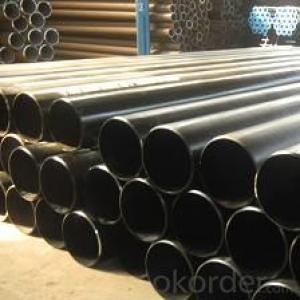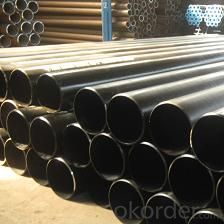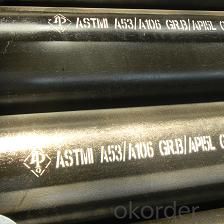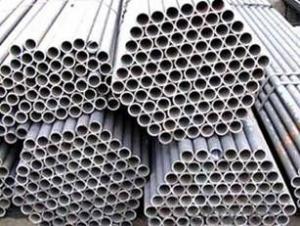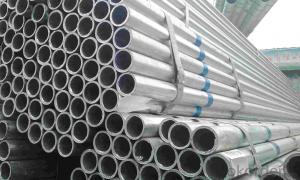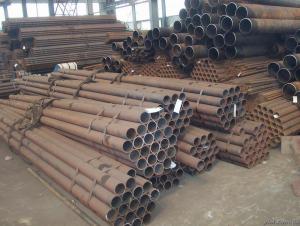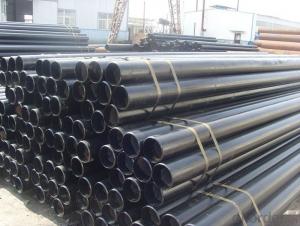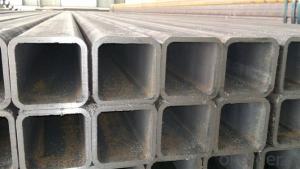STEEL PIPE SEAMLESS PIPE
- Loading Port:
- China Main Port
- Payment Terms:
- TT OR LC
- Min Order Qty:
- -
- Supply Capability:
- -
OKorder Service Pledge
OKorder Financial Service
You Might Also Like
Standard: API 5L, API 5CT, ASTM A106/A53, ASTM A519, JIS G 3441, JIS G3444, JIS G3445 DIN 2391, EN10305, EN10210, ASME SA106, SA192, SA210, SA213, SA335, DIN17175, ASTM A179…
Out Diameter: 1/8 – 30 inch (10.3-762mm)
Wall Thickness: 0.049” – 2.5” (1.24- 63.5mm)
Length: Random Length, Fixed Length, SRL, DRL
Steel Grade:
API 5L: GR B, X42, X46, X56, X60, X65, X70
ASTM A53/A106: GR A, GR B, GR C
ASME SA106: GR.A, GR.B, GR.C
ASME SA192: SA192
ASME SA209M: T1, T1a
ASME SA210: GR.A-1, GR.C
ASME SA213: T2, T5, T9, T11, T12, T22
ASME SA335: P2, P5, P9, P11, P12, P22, P91
DIN17175:ST35.8, ST45.8, 15Mo3, 13CrMo44
- Q: What are the different methods of pipe protection for steel pipes?
- There are several methods of pipe protection for steel pipes. These include corrosion-resistant coatings such as epoxy or polyethylene, cathodic protection systems, which use sacrificial anodes or impressed current to prevent corrosion, wrapping the pipes with protective tape or shrink sleeves, and using corrosion inhibitors to prevent the formation of rust. Additionally, proper installation practices, regular inspections, and maintenance can also contribute to pipe protection.
- Q: What is the difference between steel pipes and PVC-U pipes?
- Steel pipes and PVC-U pipes differ in terms of their composition, strength, and suitability for different applications. Steel pipes are made from iron and carbon, making them strong and durable, capable of withstanding high pressure and extreme temperatures. They are commonly used for transporting liquids and gases in industries like oil, gas, and construction. On the other hand, PVC-U pipes are made from polyvinyl chloride, a plastic material. They are lightweight, easy to install, and resistant to corrosion and chemicals. PVC-U pipes are typically used for water supply, drainage systems, and irrigation.
- Q: How are steel pipes used in airport infrastructure?
- Steel pipes are widely used in airport infrastructure for various purposes. They are used for constructing the framework of airport terminals, hangars, and other buildings. Steel pipes are also used for the installation of HVAC systems, electrical wiring, and plumbing in airport facilities. Additionally, steel pipes are used for the construction of runways, taxiways, and aprons, providing a strong and durable foundation for aircraft operations.
- Q: Can steel pipes be used for underground culverts?
- Indeed, underground culverts can utilize steel pipes. Renowned for their robustness, longevity, and ability to withstand diverse environmental influences, steel pipes are ideal for subterranean applications. They exhibit exceptional resilience to substantial burdens, intense hydrostatic pressure, and the erosive impact of soil and water. Moreover, steel pipes offer a range of dimensions and thicknesses, enabling customization to meet precise project prerequisites. Nevertheless, prudent consideration must be given to variables such as soil attributes, water table elevations, and the likelihood of corrosion during the selection of the most fitting steel variant and protective coatings for the pipes.
- Q: How are steel pipes used in the manufacturing of oil refineries?
- Steel pipes are used extensively in oil refineries for various purposes. They are primarily used for transporting crude oil, refined petroleum products, and various chemicals within the refineries. These pipes are also crucial for the distribution of water, steam, and other fluids required for the refining processes. Additionally, steel pipes are used in the construction of various equipment and structures in oil refineries, including storage tanks, heat exchangers, and process units. Overall, steel pipes play a vital role in ensuring the safe and efficient operation of oil refineries.
- Q: What does cathodic protection of steel tubes mean?
- Applied current: a macro cell consisting of a protected metal piece and an insoluble auxiliary component. The negative electrode of the battery is connected to the metal to be protected. The power supplies the electrons so that the metal is not corroded by missing points.
- Q: What is the difference between steel pipes and fiberglass pipes?
- Steel pipes are made from a durable alloy of iron and carbon, while fiberglass pipes are composed of a reinforced plastic material. The main difference is that steel pipes are stronger and more resistant to high temperatures and pressure, making them suitable for heavy-duty applications such as oil and gas pipelines. On the other hand, fiberglass pipes are lighter, corrosion-resistant, and have better thermal insulation properties, making them ideal for industries like chemical processing and wastewater treatment.
- Q: What are the different types of steel pipe elbows?
- There are various industries and applications that commonly utilize different types of steel pipe elbows. These types encompass: 1. 90-degree elbows: Employed when redirecting fluid or gas flow requires a sharp 90-degree bend. They find extensive use in plumbing, construction, and industrial piping systems. 2. 45-degree elbows: Similar to 90-degree elbows, these elbows alter flow direction, but with a smaller angle. They are suitable for situations requiring a more gradual change in flow direction. 3. Long radius elbows: Differing from standard elbows, long radius elbows possess a larger curvature radius. This design minimizes fluid friction and pressure drop, making them ideal for applications necessitating smoother flow, such as high-flow systems or those involving viscous fluids. 4. Short radius elbows: In contrast, short radius elbows feature a smaller curvature radius. They are generally utilized in confined spaces where a compact design is essential, although they may lead to increased fluid friction and higher pressure drops. 5. Reducing elbows: These elbows are ideal for connecting pipes of varying diameters. With one end having a larger diameter and the other end with a smaller diameter, they enable a seamless transition between two pipes of different sizes. 6. Mitered elbows: Mitered elbows are tailor-made elbows fabricated by cutting and welding multiple pipe sections at specific angles. They are frequently employed when standard elbows cannot accommodate the required angle or when a unique design is necessary. In conclusion, the selection of the appropriate type of steel pipe elbow depends on factors such as the specific application, fluid flow requirements, space limitations, and compatibility with the piping system.
- Q: How are steel pipes used in construction?
- Steel pipes are commonly used in construction for various purposes such as structural support, plumbing, and transportation of fluids and gases. They are used in building frameworks, bridges, and underground infrastructure, providing strength, durability, and flexibility. Steel pipes are often employed in plumbing systems for water supply and drainage. Additionally, they serve as conduits for conveying gas, oil, and other substances. Their versatility and strength make steel pipes an essential component in modern construction projects.
- Q: What are the common factors affecting the lifespan of steel pipes?
- There are several common factors that can affect the lifespan of steel pipes. 1. Corrosion: Corrosion is one of the primary factors that can significantly reduce the lifespan of steel pipes. Exposure to moisture, chemicals, and harsh environmental conditions can cause the steel to rust and deteriorate over time. 2. Quality of materials: The quality of the steel used in manufacturing the pipes plays a crucial role in determining their lifespan. Higher-quality steel with better resistance to corrosion and other forms of degradation will generally have a longer lifespan compared to lower-grade materials. 3. Installation and maintenance practices: Proper installation and regular maintenance are essential for ensuring the longevity of steel pipes. Improper installation techniques, such as inadequate support or improper alignment, can lead to premature failure. Similarly, neglecting routine maintenance, such as cleaning and inspection, can accelerate the degradation process. 4. Operating conditions: The operating conditions to which steel pipes are exposed can also impact their lifespan. Factors such as temperature, pressure, and the type of fluid or gas being transported can all affect the integrity of the pipes. Extreme conditions, such as high temperatures or corrosive substances, can significantly reduce the lifespan of steel pipes. 5. Mechanical stress: Excessive mechanical stress, such as vibration, impact, or heavy loads, can weaken steel pipes over time. This stress can lead to cracking, deformation, or even complete failure if not properly managed or accounted for during the design and installation process. 6. Environmental factors: The surrounding environment can have a significant impact on the lifespan of steel pipes. Exposure to harsh weather conditions, such as extreme temperature variations or frequent freeze-thaw cycles, can accelerate the deterioration process. Additionally, the presence of pollutants or aggressive substances in the surrounding soil or water can also contribute to the degradation of steel pipes. In summary, the lifespan of steel pipes can be affected by factors such as corrosion, material quality, installation and maintenance practices, operating conditions, mechanical stress, and environmental factors. By considering and addressing these factors, it is possible to extend the lifespan of steel pipes and ensure their durability and reliability.
Send your message to us
STEEL PIPE SEAMLESS PIPE
- Loading Port:
- China Main Port
- Payment Terms:
- TT OR LC
- Min Order Qty:
- -
- Supply Capability:
- -
OKorder Service Pledge
OKorder Financial Service
Similar products
Hot products
Hot Searches
Related keywords
